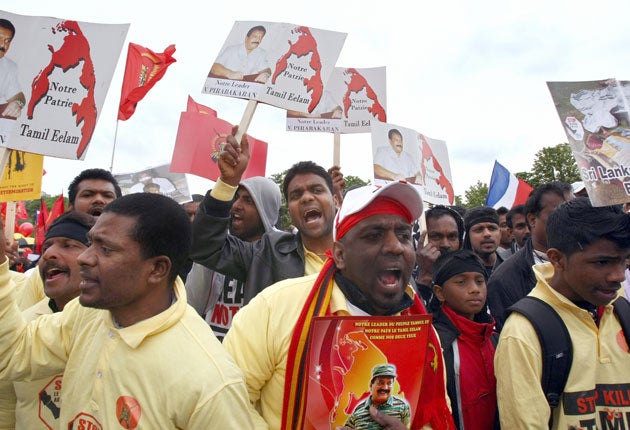Sri Lanka rebels declare cease-fire

Sri Lanka's rebels declared a unilateral cease-fire today, but the government refused to halt its offensive into the last strip of land the insurgents hold despite concerns for tens of thousands of civilians trapped there.
A top UN official urged Sri Lankan leaders to let aid into the tiny war zone along the northeastern coast, as reports have grown of starvation and casualties among those stuck inside.
The rebels, who have voluntarily halted their fight before, said in a statement e-mailed to The Associated Press that the "humanitarian crisis can only be overcome by the declaration of an immediate cease-fire." They urged the international community to persuade the government to lay down its arms also.
But Sri Lanka's Defense Secretary Gotabhaya Rajapaksa rejected the call saying the rebels were "running" from government forces. In recent months, troops have pushed deep into the Tamil Tigers' strongholds in the north, surrounding the beleaguered rebels and vowing to end the quarter-century war.
UN Undersecretary General for Humanitarian Affairs John Holmes held meetings Sunday with senior officials in Colombo and was "underscoring the urgent need for humanitarian access by the UN to the combat zone," UN spokesman Gordon Weiss said.
Aid workers have been barred from the region since fighting escalated in September.
Holmes, who arrived late Saturday, had previously called on the government to suspend its offensive to allow an estimated 50,000 trapped civilians to escape. The rebels have warned the number of noncombatants is three times that figure.
Holmes was to head Monday to the northern region of Vavuniya to inspect displacement camps and hospitals that have been overwhelmed by the more than 100,000 civilians who fled the war zone over the past week.
British Foreign Secretary David Miliband will also visit Sri Lanka with his French and Swedish counterparts on Wednesday to try to mediate on the conflict, according to a statement from the prime minister's office in London.
The UN says nearly 6,500 civilians have been killed in the fighting over the past three months. Holmes said Saturday that the trapped civilians were suffering a "very high" casualty rate, and from lack of food, clean water and medical supplies.
The government insists it has sent food and medicines and accuses the rebels of holding the civilians as human shields. It is not possible to verify the claims because the government has barred independent journalists from the war zone, arguing that it is too dangerous for them to work.
Meanwhile Sunday, President Mahinda Rajapaksa's coalition won a sweeping victory in an election seen as a referendum on its fight against rebels.
The governing United People's Freedom Alliance coalition was declared the overwhelming winner in the latest poll, sweeping nearly two-thirds of the vote in the Western Province. The coalition even won in the capital, Colombo, long a stronghold of the opposition United National Party, which advocated talks with the rebels.
The governing coalition now controls all eight of the country's provincial councils.
"The electorate ... clearly responded to the call of the president for a united Sri Lanka," Media Minister Anura Yapa said.
In a sign, the rebels are feeling the pressure of the army's monthslong offensive, 23 insurgents surrendered on Sunday.
Dressed as civilians, they turned themselves over to the advancing troops, said Brig. Udaya Nanayakkara, the military spokesman.
Last week, two prominent rebels — the group's former media spokesman, Velayutham Dayanithi, whose nom de guerre is Daya Master, and an interpreter for group's political wing, known only as George — surrendered.
The rebels, listed as a terrorist group by many Western nations, have been fighting since 1983 for an ethnic Tamil state in the north and east after decades of marginalization by governments dominated by the Sinhalese majority. After more than three years of intense fighting, the military stands on the verge of crushing the group.
Fighting, meanwhile, continued today in the ever-shrinking war zone, with sea battles and infantry clashes.
Navy patrol boats destroyed three rebel boats, killing at least 12 insurgents early Sunday, said navy spokesman Cmdr. Mahesh Karunaratne. He said that the guerrillas were preparing to attack army troops on the coast.
Join our commenting forum
Join thought-provoking conversations, follow other Independent readers and see their replies
Comments
Bookmark popover
Removed from bookmarks